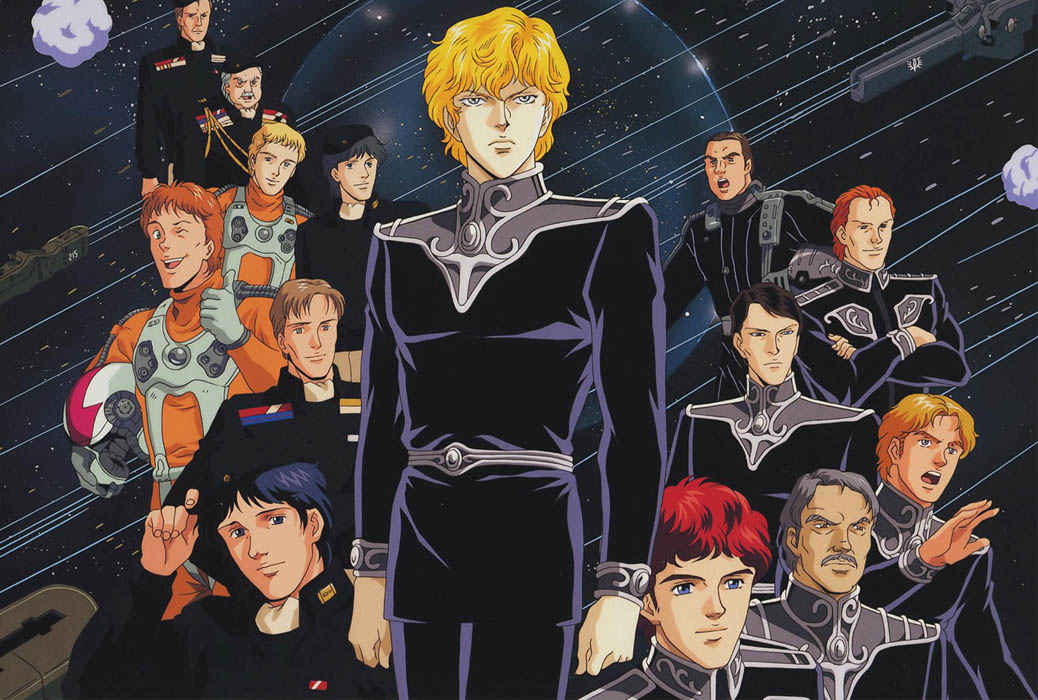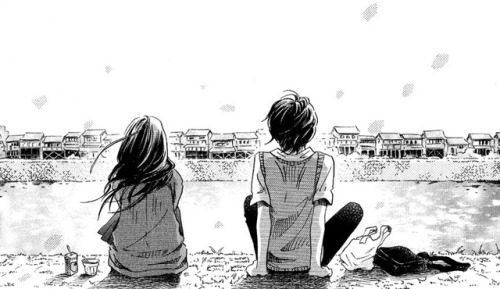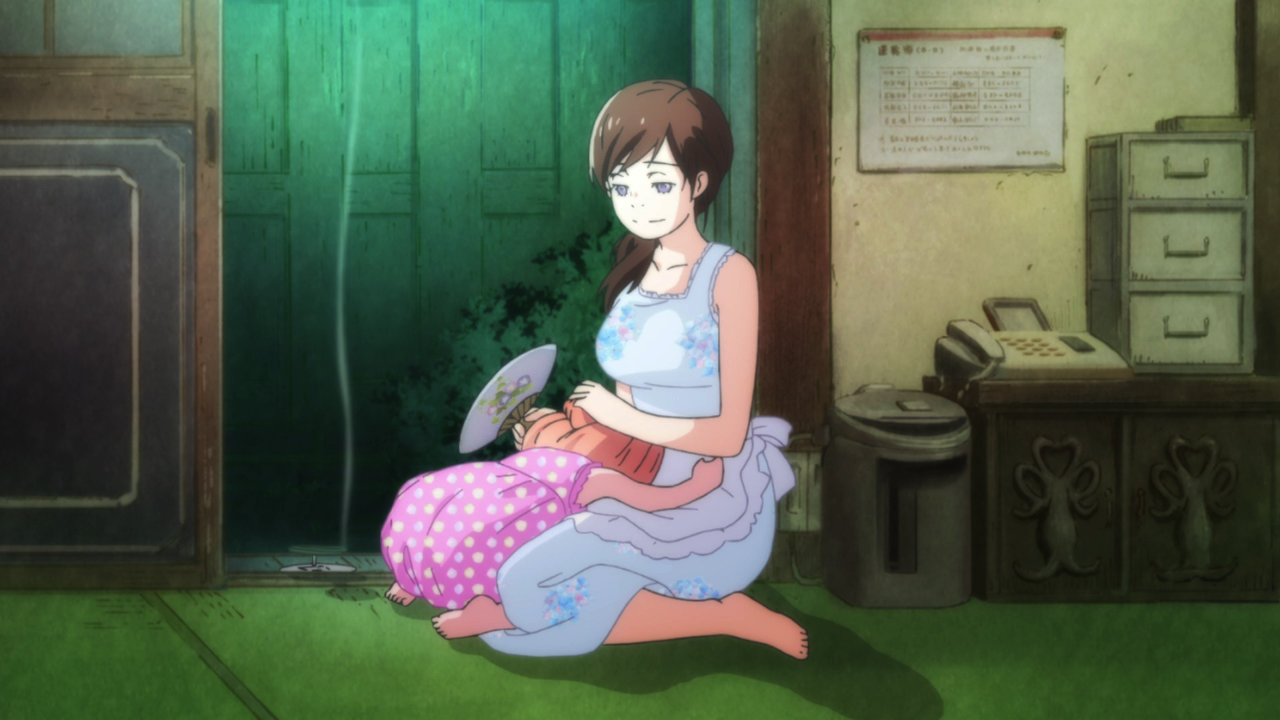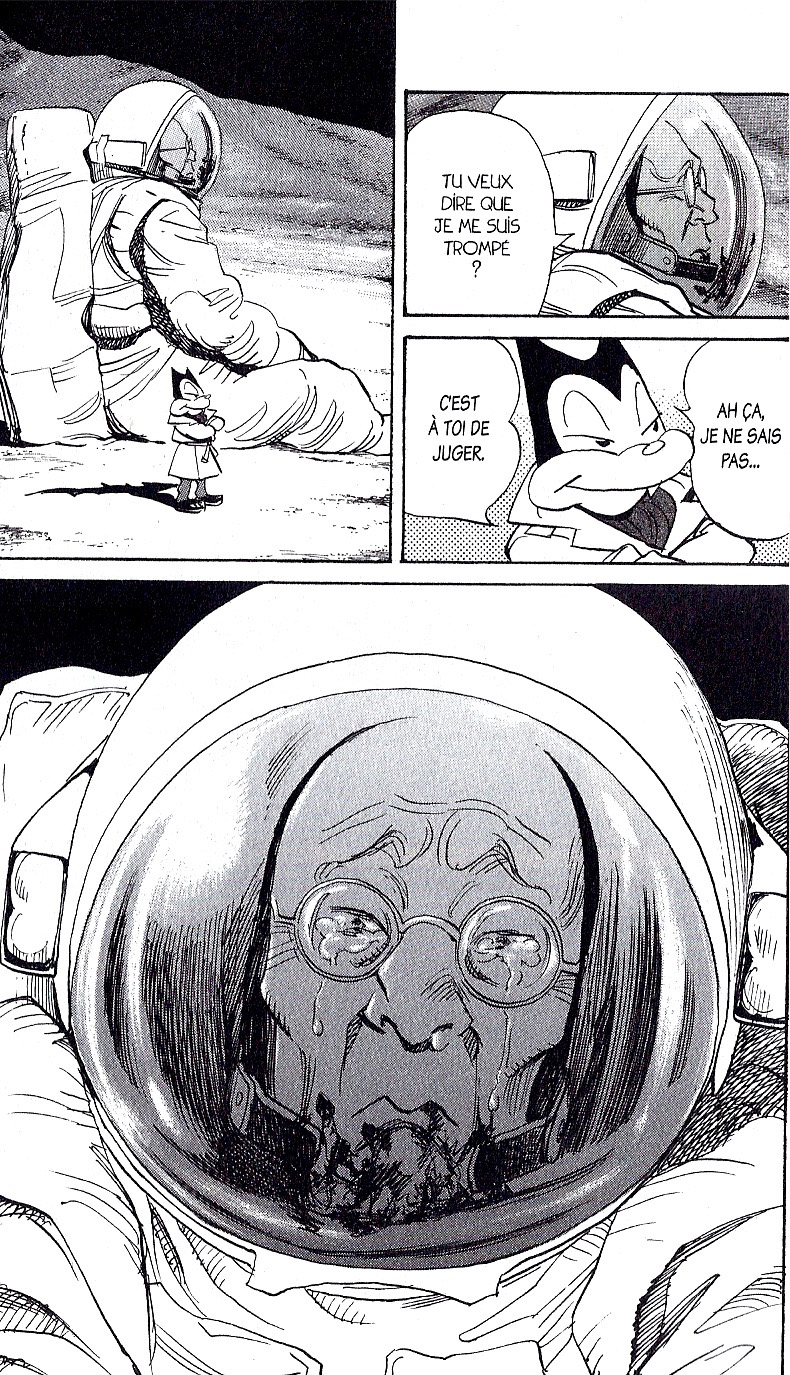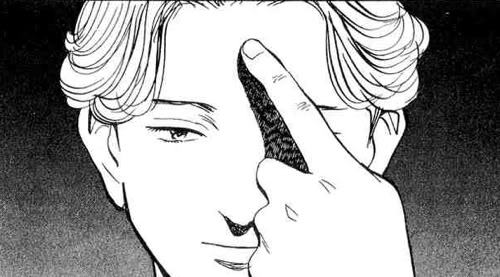
(Ok just seeing more of this guy, is a good enough reason why there should be a new LOGH anime)
At the core LOGH is the story of the ascension to prominence of two young individuals, Yang and Reinhard. Yang is particular is really hard to define when looking to some of his attributes. Because of being marked by contrasting characteristics, a pacifist that acts as the brightest and most successful admiral in the history of the free planets alliance. An idealist, always thinking and talking of the world as it should be, instead of how it is, but always keeps his actions, to a degree of enviable practicality. A historian at heart, with the eyes firmly at the past, but usually against his will is forced to create and become a part of history, in deciding the key events that change the fate of nations. The freedom of thinking and acid critic he enacts, being directly against the strict dogmatism and value of authority, which makes the organization he is in, the army, in pretty all its occurrences. A humble man always doubting his own judgement and the paths he chooses, while getting forced to make the most important decisions imaginable. Which give a lot of understanding to his passive aggressive nature, that some find off-putting. It comes from a place of never getting your wishes achieved or listened to, and having your own existence to be about following other people's dreams and illusions. He in effect knows the problems and defects in society better than everyone, but finds himself unable and unwilling to do something about it. As Yang does not believe he has the right to do so. Onto him, you can find the maximum ideals of democracy represented. No matter how Yang personally can disagree, find an order stupid or preposterous, they come off as absolute. Because they come from the system, are issued by the elected representatives of the people, the only ones capable of exerting sovereignty through the popular vote, there is no room for not obeying here. One of the more general conceits of democracy is to exert control not only on the ends, the objective society’s wants, but on the means, the way to get there. A single instance illustrates this perfectly and is the apotheoses of what the character stands for (spoilers for the freaking OVA). When faced with a golden opportunity, a way to destroy the leader of the galactic empire, in effect saving the free planet alliance, the ultimate goal anyone on the country could advocate for, he does not act. Instead he obeys an order of cease fire, which would most certainly doom the country, because regardless of how justified the ends may be, they are only as righteous as their means. The correct ways and means for acting, make the correct goals in a democratic society, and Yang express the full extension of that, with a single decision. A general humanism also marks the character, human lives are never tools to be played with, used to achieve superiority or tactical advantages. Instead he makes them the goal, saving and ensuring the lives of as many people he can, is the modus operandi and tactic for Yang. Satisfaction of the individual can be traced as main ideological objective for most modern democracy, and for putting those in the forefront it helps to drives this point, something that paradoxically his government completely forgot, amidst its nationalistic ideals.
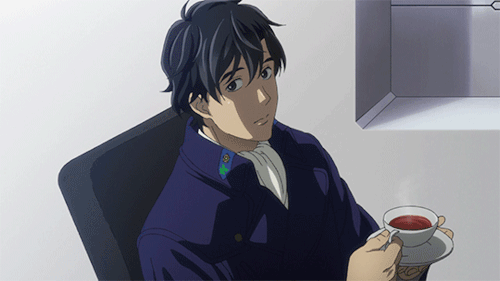
(Could not make a logh review without showing Yang drinking tea, this is the absolute representation of the show)
As a contrasting figure (not as good though) we have Reinhard. Looking at his worries with efficiency and results gives great insight into the character. Unlike Yang, those are the major things he cares about, his conflict with the nobles does not come from a moral rejection from the awful things they enact, since he is willing to go to the same lengths, but from how they lack the capacity to rule, a complete inefficiency in doing so. Instead of worrying with methods the results are absolute here. His justification to strive for power, to think as righteous in ruling over others, is a believed conceit of being actually superior, he has the best talent and knowledge, can bring results no one else can. Reinhard is entitled to issue orders, to become a supreme ruler of the galaxy, because of being in effect the best man. Yes, he is this kind of conceited, egotistical brat. Where to someone else with more abilities to appear, he would be right to challenge and attempt to rule as well. His ideology is born from an idea of putting the capacity to decide, and actually solving the issues as main goals, the justification of a government. Despite bizarrely never taking such ideas to its logical conclusion, since those are encapsulated by his subordinate, Oberstein. There are hints of romanticism, a valorization of a fair fight and some general ethical ideals (as hypocritical as they come), which never allows him to do so. The relation with his father also adds a lot , a man that achieved nothing in life, and lived in terms of lineage and memories of dead ancestors, exactely the ideals Reinhard found disguting, and stood the entire live trying to denie. Both the in history parallel with the Rudolf dictatorship and the historical parallel with the Nazi regime are also pertinent here. In either, you can see the same worries with efficiency, the debates and democratic system, the individual liberties were silenced, to allow for greater decidability. In the name of efficiency and nebulous goals, any form of control of a government acts were dropped, which gave birth to a catastrophe that killed millions. They give a certain air of terror to young Reinhard’s ascension, since the audience is never sure he will not fall to the same pitfalls, become a similar monster in another display of history ever repeating cycle.

(I have finally became a truly sophisticated individual after wathcing this)
To be fair, the focus on powerful people also makes for what I believe is LOGH greatest flaw. In displaying a fascination with history, it becomes very clear what kind of history is attempted to be portrayed here, the one focused on individuals, great names and figures, that eclipse everything else and mold its run. This universe seems to be inhabited, by barely anyone else but those in power. How many foot soldiers, the unknowns, with names forgotten by time, that actually fight and act in wars did we follow on this narrative? Very little and their appearances barely have an impact, or much relevance only being tools to represent the horrors of war (cutting 90% of Poplan and his group scenes and relevance is like the dumbest creative decision they could take). With the only moment you could argue otherwise is the Schenkopp sequence on Iserlohn (isn`t he also a really high level commander though?). This leads to a weirdly impersonal way of combat, where the things that matter are the commander plans (those little graphics of fleets are more relevant than any foot soldier), rather than the reality of the people amidst the battle. This is really far from the ideal, not allowing to get a full grasp of what is happening, the full magnitude of the massacres displayed before our eyes. The maximum you can get of that, is brief glimpse of unknowns getting tricked and killed in a flash, so hooray for giving a dawn.
Though it could be argued, it makes up for everything I said above, with the sheer scope of what is being attempted. The scale of the developing narrative is something very rarely reproduced in fiction, most important plot beats give this sense of grandness something really epic happening. Most twists and turns matter a lot, seem to change and mold the mere fabric of this universe, its long standing history. The takeover of the greatest fortress and the largest invasion force ever seen, being great examples of that, giving the sense we can merely grasp the magnitude of what is occurring. Despite this season still presenting a really straightforward, and simple republican x empire conflict. Most of the major players, which will make for a way more multifaceted, complex struggle were merely introduced like Oberstein, Trunhilt, Reuenthal, the nobles, Rubinky. Which is when LOGH actually comes to shine, with lots of interesting well developed character, each moving their own political and personal agendas, making for a way more engaging and developed conflict. Nevertheless, the seeds of it all can be traced here, and this quality of the narrative can be perceived really early on (not that the animation does much to capitalize on this, but whatever).
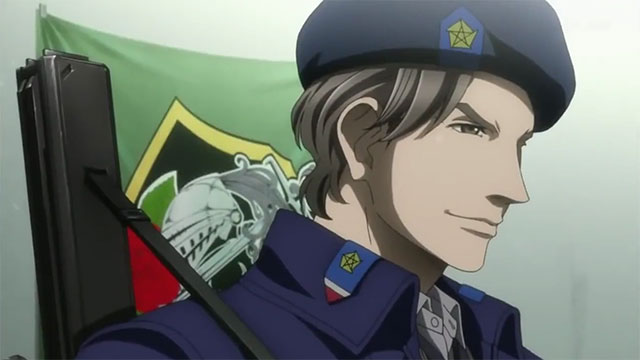
(Kind of love how he seems ready to open someone's head with an axe at a moments notice in this picture)
There is also a long standing issue I have with the way it presents some antagonistic characters (calling for villains in this narrative I kind of hard). The show has kind of an attitude of trying really hard with those, to the point they are fleshed out, bring meaningful and well developed ideological and personal conflicts, or not all with some that have absolutely nothing going for them. The series is infamous for the stupidity of some of its cast and for good reasons. The sheer idiocy they manage to achieve is kind of hard to describe. An apt comparison would be to say they are a lot like the antagonist in the famous anime series Akame Ga Kill, shallow, idiotic mass murders. You can see the type whenever there is an admiral which usually hits his subordinates a lot, or is really eager to meaningless die by sacrificing his entire fleet for a warrior’s pride or bullshit like that. They have this really exaggerated and hard to take serious personality, and make the dumbest decisions possible in the face of battle. Having these over the top personalities would be not of an issue in of itself, the problem is they really lack variety in their madness, usually displaying a really boring monotone mindset and actions. Like the most different of those is the proclaimed rival of Yang, and only because of hiding his own stupidity in a lot of empty rhetoric. And they also never create, are the source for interesting conflict, or really add anything of value to the overall narrative. They represent worthless obstacles, which our protagonists surpass with ease, and to show how fucking awesome they are supposed to be. It’s like having everybody to say this is not enough already, we have to nerf everybody else for them to look even better.
On a better note, the pacing which was the long standing fear of the franchise fans was not much of an issue here. It is a bit more rushed than the older version, but tells mostly the same events just fine. That is until the last episode, which finds to be a good idea to rush as fuck some key narrative elements. What is supposed to be happening is not really easy to understand, much less to engage and feel the impact of certain events. I swear, I would not be bringing this up as a flaw, if it was for the sake of amounting to a satisfying end note for some narrative threads. Which is completely not the case, the story stops in the middle of the conflict, leaving us in one of the more insulting cliffhangers endings (or as I like to call them, fuck you finales) I have ever seen. So well done guys, you almost made it, but fucked in the last possible moment.
Being frank, I was also really not a fan of the character designs, pretty noticeably the ones that changed drastically from the old OVA. They took one of the titles with more varied and iconic character designs in the medium (like frankly there no two individuals with the same hair, from the hundreds in the Ova’s cast) and turned the main ones into generic bishounens. A weird case where you can find the importance of the character being inversely proportional to how generic they are designed.
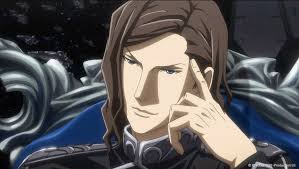
(Someone should be shot, for what they did with fucking Reuenthal's character)

(I have finally became a truly sophisticated individual after wathcing this)
To be fair, the focus on powerful people also makes for what I believe is LOGH greatest flaw. In displaying a fascination with history, it becomes very clear what kind of history is attempted to be portrayed here, the one focused on individuals, great names and figures, that eclipse everything else and mold its run. This universe seems to be inhabited, by barely anyone else but those in power. How many foot soldiers, the unknowns, with names forgotten by time, that actually fight and act in wars did we follow on this narrative? Very little and their appearances barely have an impact, or much relevance only being tools to represent the horrors of war (cutting 90% of Poplan and his group scenes and relevance is like the dumbest creative decision they could take). With the only moment you could argue otherwise is the Schenkopp sequence on Iserlohn (isn`t he also a really high level commander though?). This leads to a weirdly impersonal way of combat, where the things that matter are the commander plans (those little graphics of fleets are more relevant than any foot soldier), rather than the reality of the people amidst the battle. This is really far from the ideal, not allowing to get a full grasp of what is happening, the full magnitude of the massacres displayed before our eyes. The maximum you can get of that, is brief glimpse of unknowns getting tricked and killed in a flash, so hooray for giving a dawn.
Though it could be argued, it makes up for everything I said above, with the sheer scope of what is being attempted. The scale of the developing narrative is something very rarely reproduced in fiction, most important plot beats give this sense of grandness something really epic happening. Most twists and turns matter a lot, seem to change and mold the mere fabric of this universe, its long standing history. The takeover of the greatest fortress and the largest invasion force ever seen, being great examples of that, giving the sense we can merely grasp the magnitude of what is occurring. Despite this season still presenting a really straightforward, and simple republican x empire conflict. Most of the major players, which will make for a way more multifaceted, complex struggle were merely introduced like Oberstein, Trunhilt, Reuenthal, the nobles, Rubinky. Which is when LOGH actually comes to shine, with lots of interesting well developed character, each moving their own political and personal agendas, making for a way more engaging and developed conflict. Nevertheless, the seeds of it all can be traced here, and this quality of the narrative can be perceived really early on (not that the animation does much to capitalize on this, but whatever).

(Kind of love how he seems ready to open someone's head with an axe at a moments notice in this picture)
There is also a long standing issue I have with the way it presents some antagonistic characters (calling for villains in this narrative I kind of hard). The show has kind of an attitude of trying really hard with those, to the point they are fleshed out, bring meaningful and well developed ideological and personal conflicts, or not all with some that have absolutely nothing going for them. The series is infamous for the stupidity of some of its cast and for good reasons. The sheer idiocy they manage to achieve is kind of hard to describe. An apt comparison would be to say they are a lot like the antagonist in the famous anime series Akame Ga Kill, shallow, idiotic mass murders. You can see the type whenever there is an admiral which usually hits his subordinates a lot, or is really eager to meaningless die by sacrificing his entire fleet for a warrior’s pride or bullshit like that. They have this really exaggerated and hard to take serious personality, and make the dumbest decisions possible in the face of battle. Having these over the top personalities would be not of an issue in of itself, the problem is they really lack variety in their madness, usually displaying a really boring monotone mindset and actions. Like the most different of those is the proclaimed rival of Yang, and only because of hiding his own stupidity in a lot of empty rhetoric. And they also never create, are the source for interesting conflict, or really add anything of value to the overall narrative. They represent worthless obstacles, which our protagonists surpass with ease, and to show how fucking awesome they are supposed to be. It’s like having everybody to say this is not enough already, we have to nerf everybody else for them to look even better.
On a better note, the pacing which was the long standing fear of the franchise fans was not much of an issue here. It is a bit more rushed than the older version, but tells mostly the same events just fine. That is until the last episode, which finds to be a good idea to rush as fuck some key narrative elements. What is supposed to be happening is not really easy to understand, much less to engage and feel the impact of certain events. I swear, I would not be bringing this up as a flaw, if it was for the sake of amounting to a satisfying end note for some narrative threads. Which is completely not the case, the story stops in the middle of the conflict, leaving us in one of the more insulting cliffhangers endings (or as I like to call them, fuck you finales) I have ever seen. So well done guys, you almost made it, but fucked in the last possible moment.
Being frank, I was also really not a fan of the character designs, pretty noticeably the ones that changed drastically from the old OVA. They took one of the titles with more varied and iconic character designs in the medium (like frankly there no two individuals with the same hair, from the hundreds in the Ova’s cast) and turned the main ones into generic bishounens. A weird case where you can find the importance of the character being inversely proportional to how generic they are designed.
(Someone should be shot, for what they did with fucking Reuenthal's character)
A way larger problem comes with the way the empire is represented in this series. A huge part of the appeal of the older series, was how the conflict was rather ambiguous, with no clear good and bad guys (in some instances). This quality is lost when you have such a great focus on the alliance side though. It is kind of hard to argue the imperial side is not being represented as a villain in this particular narrative. The aesthetical way they presented pretty much says so, they enact morally reprehensible acts, which barely anyone in the free planets alliance does. And not much happens on their side of thigs, sure Reinhard and Kircheis get some development and are represented in a more sympathetic light, but this makes them closer to understandable complex villains than anything else. Not sure how to fix this though, most of the important events in this part of the novel and 1988 OVA are happening in the alliance’s side, to the point if they stopped at this point, they would have the same issue. So here is just a wish that they fix this on later seasons, movies, getting to the point where the galactic empire is more meaningfully fleshed and becomes way more than the adversary, because so far that is not really the case.
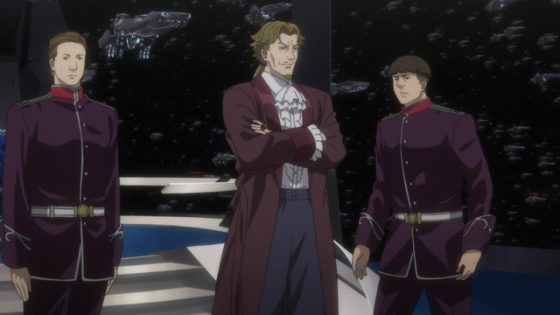
(This really is some akame ga kill level of conflict and resolution, I am not kidding)
An utmost understated quality LOGH always had is how it always have known how to bring out the fun. In such a serious looking narrative, encompassing a war epic with lots of mature themes, this may come as a surprise to some (there are no characters staring blankly for hours while no dialogue happens, making for a boring pseudo contemplative tone here). This narrative contains elements of pulpy ridiculous violence, when we have soldiers actually fighting hand to hand with hammers, axes and the sorts, and this being the decisive factor in space warfare (can you think of something more ridiculously awesome than that?). There are also the really cheesy melodramatic speeches, and character deaths culminating on those over the top displays of their lives and paths, the really hammy exaggerated villains (okay those were always lame). These are funny additions to the narrative and help to showcase how you are actually allowed to have fun, and portray some ridiculous shit in such a serious narrative. Which comes off as a shame, because those were mostly absent in the remakes narrative so far.

(Please give me more of these guys, goddawnit)
So does this new anime deserve a ludicrous title of savior of anime, because of its amazing quality? Hell no. Is it a worthy successor to the original 1988 OVA? Not quite. However, it is a thematically interesting experiment, with (emphasis on some) great characters, and elements that are hard to find elsewhere. I am definitely interested to see how they can further develop this in movies, and in what our galactic heroes will do next. If you have an interest in history though, just do yourself a favor and watch it, the fascination this series has with this topic is impalpable, and can be seen though several parallels, references and just the general story.

(This really is some akame ga kill level of conflict and resolution, I am not kidding)
An utmost understated quality LOGH always had is how it always have known how to bring out the fun. In such a serious looking narrative, encompassing a war epic with lots of mature themes, this may come as a surprise to some (there are no characters staring blankly for hours while no dialogue happens, making for a boring pseudo contemplative tone here). This narrative contains elements of pulpy ridiculous violence, when we have soldiers actually fighting hand to hand with hammers, axes and the sorts, and this being the decisive factor in space warfare (can you think of something more ridiculously awesome than that?). There are also the really cheesy melodramatic speeches, and character deaths culminating on those over the top displays of their lives and paths, the really hammy exaggerated villains (okay those were always lame). These are funny additions to the narrative and help to showcase how you are actually allowed to have fun, and portray some ridiculous shit in such a serious narrative. Which comes off as a shame, because those were mostly absent in the remakes narrative so far.
(Please give me more of these guys, goddawnit)
So does this new anime deserve a ludicrous title of savior of anime, because of its amazing quality? Hell no. Is it a worthy successor to the original 1988 OVA? Not quite. However, it is a thematically interesting experiment, with (emphasis on some) great characters, and elements that are hard to find elsewhere. I am definitely interested to see how they can further develop this in movies, and in what our galactic heroes will do next. If you have an interest in history though, just do yourself a favor and watch it, the fascination this series has with this topic is impalpable, and can be seen though several parallels, references and just the general story.
